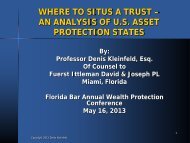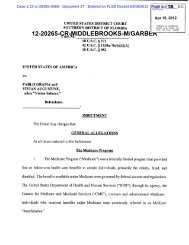here - Fuerst Ittleman David & Joseph, PL
here - Fuerst Ittleman David & Joseph, PL
here - Fuerst Ittleman David & Joseph, PL
You also want an ePaper? Increase the reach of your titles
YUMPU automatically turns print PDFs into web optimized ePapers that Google loves.
Case 3:10-mc-00024-GEB Case: 11-1612 Document: -DEA Document 003110561288 25 Filed Page: 01/07/11 62 Date Page Filed: 9 of 06/13/2011<br />
17 PageID: 473<br />
to force him to settle a collateral dispute, or that the IRS is acting solely as an<br />
information-gathering agency for other departments, such as the Department of Justice, or the<br />
FBI, the summons will be unenforceable because of the IRS’s bad faith.” Pickel v. United States,<br />
746 F.2d 176,185 (3d Cir. 1984) (reversing district court’s quashing of IRS summons, w<strong>here</strong><br />
petitioners did not present evidence of bad faith) (citations omitted). The Circuit explained in<br />
Rockwell that the good faith inquiry in<strong>here</strong>s in the Powell consideration of a legitimate<br />
investigative purpose, in that “the requirement of legitimate purpose means nothing<br />
more than that the government’s summons must be issued in good faith pursuant to one of the<br />
powers granted under 26 U.S.C. § 7602.” 897 F.2d at 1262. Further, in the context of similar<br />
administrative summonses issued by the SEC, the Circuit has indicated that “non-frivolous<br />
allegations of [abuse of process] do constitute sufficient grounds for further proceedings,<br />
including discovery.” SEC v. Wheeling-Pittsburgh Steel Corp., 648 F.2d 118, 128 (3d Cir. 1981)<br />
(en banc).<br />
Other than the length of the investigation (five years), Petitioners have presented no<br />
evidence that the IRS has conducted its investigation of Petitioners with an improper purpose,<br />
such as harassment. Instead, Petitioners arguments, if correct, would invalidate any IRS<br />
summons issued pursuant to these policies to investigate tax anomalies in the Virgin Islands.<br />
Such a position does not present a non-frivolous claim of abuse-of-process, but challenges the<br />
IRS’s investigatory discretion. Cf. Wheeling-Pittsburgh, 648 F.2d at 127–29 (permitting<br />
discovery on the allegation that a Congressman improperly influenced the SEC’s investigative<br />
process, but noting that the court “w[ould] not countenance judicial interference with agency<br />
decisions to conduct investigations”). The Court finds that Petitioners’ “institutional bad faith”<br />
9<br />
A-000017










